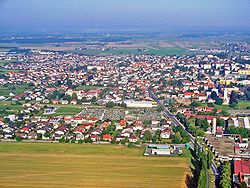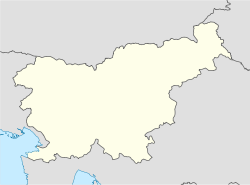- Murska Sobota
-
Murska Sobota
Muraszombat
Mürska Sobouta— City — City of Murska Sobota Location of the city of Murska Sobota in Slovenia Coordinates: 46°40′N 16°10′E / 46.667°N 16.167°ECoordinates: 46°40′N 16°10′E / 46.667°N 16.167°E Country  Slovenia
SloveniaGovernment - Mayor Anton Štihec (SLS) Area - Total 14.5 km2 (5.6 sq mi) Population (2010)[1] - Total 11,679 - Density 806/km2 (2,087.5/sq mi) Time zone CET (UTC+01) - Summer (DST) CEST (UTC+02) Website murska-sobota.si Murska Sobota (
 pronunciation (help·info)) (Hungarian: Muraszombat, Prekmurje dialect: Mürska Subouta) is a city in northeastern Slovenia. It is located in the eponymous municipality near the Mura River in the region of Prekmurje and is the regional capital.
pronunciation (help·info)) (Hungarian: Muraszombat, Prekmurje dialect: Mürska Subouta) is a city in northeastern Slovenia. It is located in the eponymous municipality near the Mura River in the region of Prekmurje and is the regional capital.Contents
Name
Officially, the city is known as Murska Sobota, although informally it is usually simply referred as Sobota.[citation needed] The traditional German name of the city is Olsnitz, which is derived from the old Slovene name Olšnica. The modern Slovene name is a translation of the Hungarian name Muraszombat, which was the official name of the city until 1919. In Hungarian, szombat means 'Saturday', referring to the city's practice of holding fairs every week on that day. Murska Sobota was a district (Hungarian: járás) city of Vas County in the Kingdom of Hungary until 1918. It was occupied by Hungary again during World War II, from 1941 to 1944. Between 1944 and 1945 it was under Nazi German occupation and it was liberated by Soviet troops in May 1945. It was also part of the Balatin Sanjak, which belonged at first to the Budin Eyalet, later the Kanije Eyaleti, before the Treaty of Karlowitz.
Features
Murska Sobota used to be Yugoslavia's northernmost city, and throughout history it has shifted across borders between Slovenia, Yugoslavia, and Hungary. Hungarians still represent a 3,000-person minority. In 1919, the Republic of Prekmurje was declared here and the city was the capital of the new state. In 1991, during the Ten-Day War between Slovenia and the Yugoslav Federal Army, Murska Sobota was bombed from the air, with no casualties or visible damage. Today, it is a quiet city with an economy based on regional administration, light industry, commerce, and spa tourism. In April 2006, the city became the see of the newly created Roman Catholic Diocese of Murska Sobota, which is a suffragan to the archdiocese of Maribor.
Jewish community of Murska Sobota
The once significant Jewish community of Murska Sobota was eliminated by Nazi Germany. Before the World War II, a synagogue built by Lipót Baumhorn stood in Murska Sobota. It was consecrated on 31 August 1908 and demolished in 1954 by the local communist authorities after they purchasing the building from a decimated Jewish community. The last rabbi in Murska Sobota was Lazar Roth.[2] He was murdered at Auschwitz.
On 26 April 1944, all of the Jews were ordered to gather in the Murska Sobota synagogue, with hand luggage only. There, they were locked up overnight without food or water, and the next morning all the Jews of Murska Sobota were transferred to Čakovec and then to Nagykanizsa, the main concentration camp before their final destination of Auschwitz.[3]
On 29 January 2010, the first Holocaust memorial in Slovenia was unveiled at the Murska Sobota railway station. It is dedicated to the exile of Jews from the Prekmurje region.[4][5]
International relations
See also: List of twin towns and sister cities in SloveniaTwin towns — Sister cities
Murska Sobota is twinned with:
 Ingolstadt, Germany (Bavaria)
Ingolstadt, Germany (Bavaria) Bethlehem (PA), USA (Pennsylvania)
Bethlehem (PA), USA (Pennsylvania) Paraćin, SRB (Pomoravlje)
Paraćin, SRB (Pomoravlje)
See also
References
- ^ Statistical Office of the Republic of Slovenia, census of 2002
- ^ History of the Jews in Murska Sobota
- ^ Jews of Murska Sobota
- ^ "Memorial to Exiled Jews Unveiled in Murska Sobota". STA. 29 January 2010. http://www.sta.si/en/vest.php?s=a&id=1474964.
- ^ "A memorial dedicated to the exile of Jews from the NE region of Prekmurje is unveiled at the Murska Sobota train station.". STA. 29 January 2010. http://www.sta.si/en/foto.php?t=0&id=163785&s=a&nid=1474964.
External links
Murska Sobota Settlements Administrative centre: Murska Sobota
Bakovci, Černelavci, Krog, Kupšinci, Markišavci, Nemčavci, Polana, Rakičan, Satahovci, VeščicaNotable people József Bagáry, Mihály Barla, György Czipott, János Fliszár, Ferenc Hüll, István Kováts, István Zsemlics, József Klekl, László SzobothinCategories:- Populated places in the Municipality of Murska Sobota
- Prekmurje
- Historic Jewish communities
- Szapáry family
Wikimedia Foundation. 2010.





